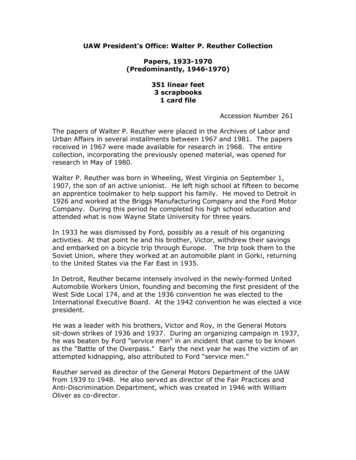
Transcription
UAW President's Office: Walter P. Reuther CollectionPapers, 1933-1970(Predominantly, 1946-1970)351 linear feet3 scrapbooks1 card fileAccession Number 261The papers of Walter P. Reuther were placed in the Archives of Labor andUrban Affairs in several installments between 1967 and 1981. The papersreceived in 1967 were made available for research in 1968. The entirecollection, incorporating the previously opened material, was opened forresearch in May of 1980.Walter P. Reuther was born in Wheeling, West Virginia on September 1,1907, the son of an active unionist. He left high school at fifteen to becomean apprentice toolmaker to help support his family. He moved to Detroit in1926 and worked at the Briggs Manufacturing Company and the Ford MotorCompany. During this period he completed his high school education andattended what is now Wayne State University for three years.In 1933 he was dismissed by Ford, possibly as a result of his organizingactivities. At that point he and his brother, Victor, withdrew their savingsand embarked on a bicycle trip through Europe. The trip took them to theSoviet Union, where they worked at an automobile plant in Gorki, returningto the United States via the Far East in 1935.In Detroit, Reuther became intensely involved in the newly-formed UnitedAutomobile Workers Union, founding and becoming the first president of theWest Side Local 174, and at the 1936 convention he was elected to theInternational Executive Board. At the 1942 convention he was elected a vicepresident.He was a leader with his brothers, Victor and Roy, in the General Motorssit-down strikes of 1936 and 1937. During an organizing campaign in 1937,he was beaten by Ford "service men" in an incident that came to be knownas the "Battle of the Overpass." Early the next year he was the victim of anattempted kidnapping, also attributed to Ford "service men."Reuther served as director of the General Motors Department of the UAWfrom 1939 to 1948. He also served as director of the Fair Practices andAnti-Discrimination Department, which was created in 1946 with WilliamOliver as co-director.
UAW President Walter P. Reuther CollectionEven before the United States' entry into World War II, Reuther conceivedthe idea of mass production of military planes using automobile plantfacilities. Despite initial opposition by industry, the "Reuther Plan," as it wasknown, was implemented once the country entered the war. During the war,he served on the War Manpower Commission and with the Office ofProduction Management.At the war's end, Reuther demanded a wage increase in negotiations withGeneral Motors, coupled with the stipulation that GM not pass the cost alongto the consumer through increased prices which would erode the advantagegained for the workers and contribute to inflation. Reuther failed to commitGM to this principle despite a 113-day strike, but the confrontationestablished him as an innovative negotiator whose sights were set onbroader goals than those of traditional unionists.At the the convention in March of 1946, after a bitter contest in which hetook a strong anti-Communist position, Reuther was elected president of theUAW, an office he held until his death. Later that year, he was elected a vicepresident of the CIO. In 1948 he was again the victim of an physical attack.His assailant, who was never apprehended despite intense efforts by theUAW, severely damaged Reuther's right arm with a shotgun blast.In 1952 Reuther succeeded Philip Murray as president of the CIO, and he ledin efforts to merge the CIO and the AFL, which came about in December of1955. He then became a vice president of the AFL-CIO and president of theIndustrial Union Department. Disagreements over social issues, organizingunorganized workers, international labor and foreign policy,the Vietnam Warand other matters, in which Reuther urged a more activist stance, led to thewithdrawal of the UAW from the AFL-CIO in 1968. In 1969 the UAW formedthe Alliance for Labor Action with the International Brotherhood of Teamstersin order to further some of the programs Reuther had advocated while in theAFL-CIO.Under Reuther's leadership, the UAW gained for its members, among othercollective bargaining breakthroughs, the guaranteed annual wage,supplemental unemployment benefits, cost-of-living escalator and annualimprovement factor provisions, pension plans, health insurance for workersand their families and profit-sharing plans. During his twenty-four-yearadministration, the UAW established its identity as a powerful, well organizedunion, successful in protecting the rights and interests of its members, yetresponsive to its social responsibilities.Reuther saw that improved living conditions for workers could not beachieved solely at the bargaining table and, consequently, used his influenceto further needed social reforms. Throughout his career he foughtdiscrimination, and he was an active participant in the civil rights movementfrom its inception. In addition, he worked for improved housing, bettereducation, medical care, consumer rights and environmental causes. He was2
UAW President Walter P. Reuther Collectionalso intensely interested in international affairs. He devoted considerableeffort to working for peace and a strong United Nations organization, and hesought to create a structure of international labor organizations independentof Communist control.He advocated union participation in the political process through political.action committees, and under him, the UAW played a leading role in workingfor candidates sympathetic to their objectives. He also devoted much time toappearances before congressional committees to urge legislation favorable tolabor and the social issues he championed. He served on numerousgovernmental panels studying such issues as atomic energy andtechnological change. He also worked energetically to better conditions inDetroit and Michigan, and in his last years, strove to effect urbanreconciliation and remedy the causes of the 1967 Detroit riot.Because of the prominent public role that he played, Reuther participated inan extraordinary number of organizations and was a friend and confidant ofmany of the most prominent individuals in the country in various spheres.He was recognized as an effective orator and he maintained a busy scheduleof speaking appearances. During his lifetime he was the recipient ofnumerous awards and honorary degrees.His career was cut short when he and his wife, May, who had shared in hisbeliefs and his work from the time of their marriage in 1936, were killed inthe crash of a small plane while on their way to the UAW educational centerat Black Lake, Michigan. They are survived by two daughters, Linda andLisa.The papers of Walter Reuther reflect his career with the UAW from itsbeginning, although the documentation for the pre-presidential period is lesscomplete. In addition to UAW material, there are extensive files relating tohis work as an officer of the CIO, the AFL-CIO and the ALA. In addition,there is considerable material relating to international labor organizations,international affairs, other labor unions, organizations of various kinds andhis work in the area of public affairs.3
UAW President Walter P. Reuther CollectionImportant subjects covered in this collection are:Alliance for Labor ActionAmerican MotorsAFLAFL-CIOAtomic energyAutomationChrysler CorporationCivil rightsCommunismCIODefenseDetroit urban affairsEducationEnvironmental conservationEqual employment opportunityFord Motor CompanyGeneral Motors CorporationGuaranteed annual wageHealth plansHousingInternational affairsInternational Confederation of Free Trade UnionsInternational Metalworkers' FederationJurisdictional disputesKorean War productionNew DetroitOrganizing workersPeacePensionsRacial integrationSkilled tradesStrikesSupplemental unemployment benefitsTechnological changeTractors for FreedomUnemploymentUAW factionalismUnited NationsWage stabilizationWomen workersWorld War II production4
UAW President Walter P. Reuther CollectionAmong the important correspondents are:Addes, George F.Bannon, KenBevan, AneurinBluestone, IrvingBowles, ChesterBurt, GeorgeCarey, James B.Cavanagh, Jerome P.Cisler, Walker L.Conway, JackCushman, Edward L.Dodds, WilliamDouglas, Paul H.Edwards, George, Jr.Erlander, TageFlemming, Arthur S.Fraser, DouglasGerber, MartinGettlinger, LarryGoldberg, Arthur J.Golden, Clinton S.Goodman, LeoGraedl, AdolpheGreathouse, PatHaywood, Allan S.Higgins, Msgr. George G.Humphrey, Hubert E.Johnson, Lyndon B.Kennedy, John F.Kennedy, RobertMazey, EmilMcClellan, John LMeany, GeorgeMontgomery, Donald E.Morris, KenRandolph, A. PhilipRauh, Joseph L., Jr.Reuther, VictorRoosevelt, EleanorRoosevelt, JamesSchnitzler, William F.Scholle, AugustSchrade, PaulSinclair, UptonStevenson, Adlai E.Stonorov, OskarStrachan, D. AlanThomas, NormanThomas, R. J.Truman, Harry S.Weinberg, NatWilkins, RoyWinn, FrankWirtz, W. WillardWoodcock, LeonardZwerdling, A. L.5
UAW President Walter P. Reuther CollectionIn addition to this collection, other UAW collections at the Archives of Laborand Urban Affairs contain considerable information about Walter Reuther,notably those from departments headed by his brothers Victor and Roy, theUAW General Motors Department Collection, the UAW Secretary-TreasurerCollections of George Addes and Emil Mazey, the UAW Local 174 Collectionand the UAW Fair Practices and Anti-Discrimination Collection.Non-UAW collections providing information on Reuther are the NorbertWiener Collection, the Citizens' Crusade Against Poverty Collection, the CIOExecutive Board Minutes and Proceedings Collection and the CIO WashingtonOffice Collection. The Archives also holds oral histories of May, Roy andVictor Reuther and many other UAW members and officials, which containpassages relating to the career of Walter Reuther.Among the many published biographies of Reuther are The Brothers Reutherby Victor Reuther, Reuther by Frank Cormier and William J. Eaton, WalterReuther and the Rise of the Auto Workers by John Barnard, Walter Reutherby Anthony Carew and The Most Dangerous Man in Detroit by NelsonLichtenstein.6
UAW President Walter P. Reuther CollectionContents572 manuscript boxes65 storage boxes3 scrapbooks1 card fileSeries I, UAW Local 174, 1936-1939, Box 1:Correspondence, minutes, notes and other materials relating toReuther's presidency of Local 174. Files are fragmentary. Somerelate to organizing, the Kelsey-Hayes sit-down and other strikesand to factionalism.Series II, UAW International Headquarters Files, 1936-1946, Boxes2-33:Correspondence, memoranda, reports and other materials relatingto Reuther's activities in various offices of the UAW prior to hiselection to the presidency of the union.Subseries A: General Files, 1936-1946, Boxes 2-17:Files relating to Reuther's work as an officer of the UAW priorto his assumption of the presidency. During this period hewas a member of the International Executive Board, a vicepresident, headed the Skilled Trades Department and the WarManpower and Consumer's Department and was director ofRegion 1A. Files relate to conventions, war production,factionalism, and to specific locals and regions.Subseries B: General Motors Department, 1936-1946,Boxes 17-28:Material relating to the General Motors Department which wasestablished in 1938 and which Reuther headed from 1939through 1948. Files document relations between the UAW andGM including negotiations, GM locals, war production, and the1945-46 strike.Subseries C: Government War Production Agencies,1941-1945, Boxes 29-33:Material reflecting Reuther's work as a representative of laborwith the Office of Production Management and the WarManpower Commission during World War II and with othergovernment agencies engaged in war productionadministration. Files relate to efforts to achieve maximumproduction and to secure a voice for labor in war productionplanning.7
UAW President Walter P. Reuther CollectionSeries III, UAW President's Office and International HeadquartersFiles, 1946-1970, Boxes 34-173:Correspondence, memoranda, reports, minutes, and other materialdocumenting the work of the President's Office during theadministration of Walter Reuther. Files relate to an extensiverange of subjects and include records from UAW conventions and theInternational Executive Board.Series IV, UAW President's Office - General Correspondence,1942-1970, Boxes 173-203:Correspondence with UAW members, the general public, officials ofother organizations and the government, prominent persons andpersonal acquaintances. It is mainly concerned with union matters,requests for help, requests for Reuther to serve on committees orfor the UAW to lend support to institutions and causes.Series V, UAW Regions, 1946-1970, Boxes 204-223:Memoranda and correspondence between the President's Office andthe UAW's regional offices and between the regional offices and localunions. Included are reports, notes, clippings and other relatedmaterials. Files have reference to constitutional questions,negotiations issues, jurisdictional disputes, organizing and strikes.Series VI, UAW Local Unions, 1946-1970, Boxes 224-273:President's office files concerning UAW local unions.Subseries A: Revoked Bylaws, 1946-1970, Boxes 224-228:Files of the revoked bylaws of UAW local unions.Subseries B: Local Union Correspondence, 1946-1970,Boxes 229-273:Correspondence, memoranda, reports, investigations, contractagreements, legal papers and other items. This subseriesreflects the interaction between local union leadership and thepresident and his staff. However, it also containscorrespondence with regional headquarters and with individualmembers. Among the subjects covered areadministratorships, appeals cases, clarifications of UAW policyand procedures, elections, strikes and problems of individualmembers.Series VII, UAW Public Review Board, 1957-1970, Boxes 274-285:Files of the Public Review Board which was created at the 16thConstitutional Convention of the UAW in April of 1957 with the statedpurpose of insuring continued "high moral and ethical standards" inthe administration of the union by further strengthening "thedemocratic processes and appeal procedures" as they affectedindividual members and subordinate bodies. The Board, composed8
UAW President Walter P. Reuther Collectionof persons eminent in the fields of education, religion and the law,provided an impartial panel to which grievances could be appealedafter the union's established procedures had been exhausted.Subseries A: General Files, 1957-1970, Boxes 274-275:Correspondence, reports and clippings relating to theestablishment of the Board, financial aspects of its operationand to its members.Subseries B: Decisions, 1957-1966, Box 276:Summaries of decisions reached by the Board.Subseries C: Case Files, 1957-1969, Boxes 277-285:Files relating to cases #46 through #199, containingcorrespondence, grievance records, reports of investigations,testimony, clippings and a variety of material offered inevidence. In most instances these files document contactsbetween the appellants and the President's Office, action takenby the International Executive Board and final disposition bythe Public Review Board. Because of the sensitive nature ofsome of these files, researchers wishing to examine them arerequired to first sign an Archives Restriction of Use Statement,which precludes the use of names and other personalinformation which could lead to the identification of individuals.These case files may not be photocopied.Series VIII, CIO President, 1952-1955, Boxes 286-300, 1 Scrapbook:Reuther's Detroit office files relating to his three-year presidency ofthe CIO.Subseries A: Administrative and General Files, 1952-1955,Boxes 286-291, 1 Scrapbook:Correspondence, memoranda, reports and other itemsrelating to administration of the CIO.Subseries B: CIO Unions, 1952-1955, Boxes 291-293:Correspondence, memoranda, reports and other materialreflecting communication between the CIO and its affiliatedunions. Files relate to organizing, jurisdictional problems andother matters.Subseries C: International Affairs, 1952-1955, Boxes 293-294:Correspondence, memoranda, reports and other materialdocumenting the CIO's relationships with foreign unions andinternational labor organizations. Files relate to fosteringinternational organization within the labor movement andeliminating Communist influence.9
UAW President Walter P. Reuther CollectionSubseries D: Correspondence, 1952-1955, Boxes 295-298:Correspondence with other organizations, prominentindividuals, goverment officials, and the general public.Subseries E: AFL-CIO Merger, 1953-1955, Boxes 298-300:Correspondence, memoranda, reports, and other materialrelating to the lengthy negotiations and arrangements whichpreceded the merger of the CIO with the AFL. Files also relateto no-raiding.agreements, jurisdictional problems andopposition within the CIO to the merger.Series IX, AFL-CIO Vice President, 1954-1968, Boxes 301-321:Files reflecting Reuther's work as vice president of the AFL-CIO from1955 until the disaffiliation of the UAW in 1968. This series isdivided into the following subseries:Subseries A: George Meany, President, 1955-1968,Boxes 301-303:Correspondence, memoranda, reports and other materialsreflecting Meany's administration of the AFL-CIO. Much of thedocumentation relates to developing policy differences withReuther leading to UAW disaffiliation.Subseries B: William F. Schnitzler, Secretary-Treasurer,1955-1968, Boxes 303-304:Correspondence, reports and other material chiefly related tothe administration of financial affairs.Subseries C: Executive Council and General Board,1955-1968, Boxes 304-309:Agendas, resolutions, reports and other items documentingthe actions of the Executive Council and the General Board.Subseries D: Regions, Councils and Local Unions, 1954-1968,Boxes 309-311:Correspondence, memoranda, reports and other materialsrelating to Reuther's routine administrative contact with theseentities and also to merger arrangements on the regionallevel.Subseries E: General Files, 1954-1968, Boxes 312-321:Correspondence, memoranda, reports, notes, pamphlets andother items relating to the operation of the AFL-CIO. Thesefiles reflect the interaction of Reuther and his staff withAFL-CIO departments, his work on committees and his recordsfrom conferences and conventions or they are related tospecific topics.10
UAW President Walter P. Reuther CollectionSeries X, IUD President, 1955-1968, Boxes 321-338:Files relating to Reuther's work as President of the Industrial UnionDepartment of the AFL-CIO, which incorporated industrial unionsformerly in the CIO and the industrial membership of many unionspreviously affiliated with the AFL.Subseries A: Executive Board and Executive Committee,1956-1968, Boxes 321-324:Transcripts of IUD Executive Board meetings plus agendasand some correspondence, notes and press releases. There isalso correspondence and other material related to ExecutiveCommittee meetings.Subseries B: Staff Members, 1955-1968, Boxes 325-329:Correspondence, memoranda, reports, reference materials,notes and other items relating to the work of variousexecutive officers of the IUD. There is information on IUDfinances, jurisdictional problems, atomic energy, common sitepicketing and administrative matters.Subseries C: General Files, 1955-1968, Boxes 329-338:Correspondence, memoranda, convention materials, reportsand other items relating to the operation of the IUD. There isinformation on building trades unions, common site picketing,the resolution of disputes arising between unions affiliated withthe IUD and those affiliated with the Building and ConstructionTrades Department of the AFL-CIO, jurisdictional problems,organizing and other matters.Series XI, Alliance for Labor Action, 1968-1970, Boxes 338-341:Correspondence, notes, resolutions, press releases, publications andclippings relating to the ALA, which was formed by the UAW with theInternational Brotherhood of Teamsters in May of 1969. The ALAwas dissolved in January of 1972. Files relate to the founding of theALA and to plans for community action, improved housing,organizing unorganized workers, tax reform and to no-raidingagreements with AFL-CIO unions.Series XII, Labor Organizations, 1946-1970, Boxes 341-365:This series contains material relating to labor unions andorganizations in the United States and Canada.Subseries A: Labor Organizations (except IAM), 1947-1970,Boxes 341-356:Correspondence, memoranda, reports, publications, and otheritems relating to labor unions and labor associations withwhich Reuther dealt in an official capacity for the UAW, theCIO, the AFL-CIO and the ALA. Files relate to organizing,negotiations, strikes, jurisdictional problems and factionalism.11
UAW President Walter P. Reuther CollectionSubseries B: International Association of Machinists,1946-1970, Boxes 356-365:Correspondence, memoranda, reports, agreements and otheritems relating chiefly to jurisdictional disputes between theUAW and the IAM.Series XIII, Government and Politics, 1943-1970, Boxes 366-437:Files relating to Reuther's activities in the areas of government andpolitics, principally as President of the UAW, but also as an official ofthe CIO and the IUD.Subseries A: Supreme Court, 1945-1970, Box 366:Correspondence between Reuther and justices of the SupremeCourt and material relating to Court appointments.Subseries B: Executive Branch, 1946-1970, Boxes 366-4081. Administrations, 1946-70, Boxes 366-370:Correspondence, memoranda and other materials pertainingto administrations of Presidents Truman through Nixon andReuther's relationships with the presidents, vice presidentsand their families. Files relate to policy matters, socialoccasions and presidential memorials.2. Departments and Agencies, 1946-70, Boxes 370-382:Correspondence, memoranda, statements and other itemsrelating to Reuther's work with various departments andagencies of the federal government. Files relate togovernment policies and regulations as they applied to theUAW; political, social and economic issues, governmentprograms and foreign affairs.3. Committees and Conferences, 1950-69,Boxes 382-408:Correspondence, memoranda, reports and other materialrelating to Reuther's participation, or that of his aides, in alarge number of governmental committees, commissions, taskforces, councils and White House conferences. Files cover awide range of subjects including equal employmentopportunity, labor-management policy, auto safety andtechnological change.Subseries C: Congress, 1943-1970, Boxes 408-425:1. Senate Correspondence, 1949-70, Boxes 408-411:Correspondence regarding legislation, hearings, issues, etc.2. House of Representatives Correspondence, 1947-70,Boxes 411-412:Correspondence regarding legislation, hearings, issues, etc.12
UAW President Walter P. Reuther Collection3. Congressional Committees and Legislation, 1943-70,Boxes 412-425:Correspondence, memoranda, reports and testimony byReuther and officers of the UAW and other unions, togetherwith related materials. A great number of topics relating tolabor, social policy and foreign policy in which Reuther and theUAW took an active interest are represented.Subseries D: State and Local Government and Politics,1946-1970, Boxes 425-430:Correspondence, memoranda and other materials relating toReuther's interest in legislation, programs and politics on thestate and local level.Subseries E: Political Campaigns, 1946-1970, Boxes 430-437:Correspondence, memoranda and other items relating toReuther's participation in political campaigns, chiefly on thenational level. The 1968 Democratic Convention isextensively documented.Series XIV, International Affairs, 1941-1970, Boxes 438-467:Files relating to Reuther's interest in fostering democraticinternational labor organizations and his contact with labor unions inother countries. This series also contains material relating to hiswork for peace and the solution of worldwide social and economicproblems and material documenting his strong interest in supportingthe United Nations. Files relate to the CIO and the AFL-CIO as wellas the UAW.Subseries A: International Labor Organizations, 1945-1969,Boxes 438-448:Correspondence, memoranda, reports and other itemsrelating to UAW participation in international labororganizations and labor conferences. Some material relatesto CIO and AFL-CIO international labor policies. The role ofthe UAW in combating Communist influence in internationallabor organizations is well documented as is their activemembership in the International Confederation of Free TradeUnions and the International Metalworkers' Federation.Subseries B: Foreign Countries, 1941-1970, Boxes 448-462:Correspondence, memoranda, reports, itineraries and otheritems relating to other countries and the Commonwealth ofPuerto Rico. Some material relates to the period beforeReuther's election to the presidency of the UAW or to hisofficial positions in the CIO and the AFL-CIO. Most of thematerial deals with labor concerns, but there is alsoconsiderable information on foreign policy concerns.13
UAW President Walter P. Reuther CollectionSubseries C: International Conferences, 1962-1966, Box 463:Correspondence, agendas, position papers and other materialhaving to do with Reuther's participation in Harpsund andBilderberg Conferences dealing with broad internationaleconomic, political and labor problems.Subseries D: United Nations, 1947-1970, Boxes 463-467:Correspondence, reports and publications regarding the UnitedNations and groups formed to further its programs. The UAWparticipated in many of these groups as an active supporter.Series XV, Organizations, 1946-1970, Boxes 467-539:Correspondence, memoranda, reports and printed material relatingto organizations with which Reuther had contact as UAW President oras an official of the CIO, the AFL-CIO or the ALA. These groups areextremely diverse in nature. They include organizations devoted tohealth care, political and social reform, peace, civil rights,community relations and consumer protection. There are alsogroups of a charitable, religious, social, political, cultural, educationalor testimonial nature.Series XVI, Speeches and Publications, 1933-1970, Boxes 539-573:Reuther's speeches and publications and also his official statements,interviews, and press conference transcripts.Subseries A: Speeches, 1937-1970, Boxes 539-563:Transcripts, drafts, notes and reference material for speechesand debates, together with some related correspondence.Some speeches are only in the form of notes.Subseries B: Interviews and Press Conferences, 1949-1970,Boxes 563-564:Transcripts, reprints and reports of interviews given byReuther and press conferences held by him, together with asmall amount of related correspondence.Subseries C: Publications, 1933-1970, Boxes 565-573:Drafts and published versions of pamphlets and magazine andnewspaper articles written by Reuther and his collaborators.Files also contain correspondence, notes and backgroundmaterial. Included are several drafts of a book manuscriptdevoted to world peace.14
UAW President Walter P. Reuther CollectionSeries XVII, Subject Reference Files, 1946-1970, Boxes 573-598:Published items, reports, reference data cards, notes and a varietyof informational materials. In addition, there is extensivecorrespondence and memoranda relating to the gathering of thisinformation or to the subject of the file or to UAW policy and actions.Files were used for the preparation of speeches, public statements,publications and for general background reference.Series XVIII, Appointments and Invitations, 1939-1970,Boxes 598-616:Subseries A: Appointment Records, 1939-1970,Boxes 598-603:Appointment diaries, correspondence regarding appointmentsand annotated monthly schedules of Reuther's activities anditineraries.Subseries B: Invitations, 1940-1970, Boxes 603-616:Correspondence, invitations, organizational brochures andother items relating to invitations from groups and individualsasking Reuther to speak or to participate in meetings,receptions or other functions.Series XIX, Biographical Files, 1936-1970, Boxes 616-638,2 Scrapbooks, 1 Card File:Subseries A: Biographical Material, 1938-1970,Boxes 616-626, Scrapbook:Correspondence, drafts of biographies, reports and clippings.These files relate to awards, degrees conferred on Reuther,physical attacks made on him and subsequent litigation andbooks written about him and his career.Subseries B: Reuther Labor Foundation, 1951-1970,Boxes 627-630:Correspondence and financial and legal records of thefoundation established by the Reuthers to use fees collectedfrom such sources as speaking engagements and donations tosupport labor-related causes.Subseries C: Death of Walter and May Reuther, 1970,Boxes 630-638, Scrapbook, Card File:Condolence messages, funeral arrangements and clippingsrelating to the deaths of the Reuthers in a plane accident onMay 9, 1970.15
UAW President Walter P. Reuther CollectionlndexesIndexes to subjects and correspondents and to Reuther's speechesand published writings will be found following container lists.Non-manuscript material:Copies of UAW convention proceedings, president's and secretarytreasurer's reports and pamphlets received with this collection havebeen added to the Archives Library.Approximately 2,000 photographs have been transferred to theArchives Audiovisual Collection, together with tapes of Reuther beinginterviewed or speaking at conventions or on the radio. In addition,an extensive collection of Reuther memorabilia, including such itemsas original art work, sculpture, posters, buttons, gavels, banners,ashtrays, hats, award certificates, honorary degrees, keys,medallions, plaques, trophies and trays, has been placed in theArchives Audiovisual Collection.16
UAW President Walter P. Reuther CollectionSeries IUAW Local 174, 1936-1939Box 1Correspondence, minut
improvement factor provisions, pension plans, health insurance for workers and their families and profit-sharing plans. During his twenty-four-year administration, the UAW established its identity as a powerful, well organized union, successful in protecting the rights and interests of its members, yet responsive to its social responsibilities.
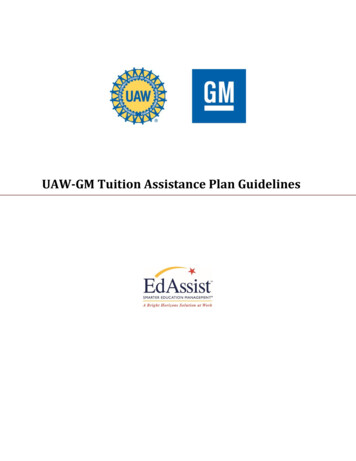
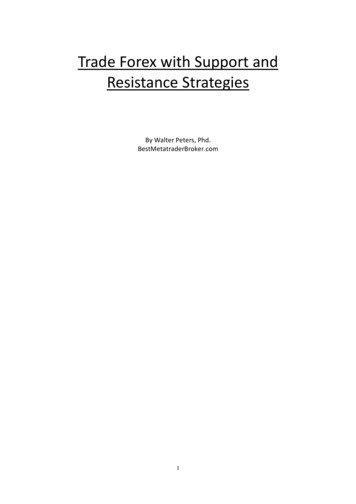
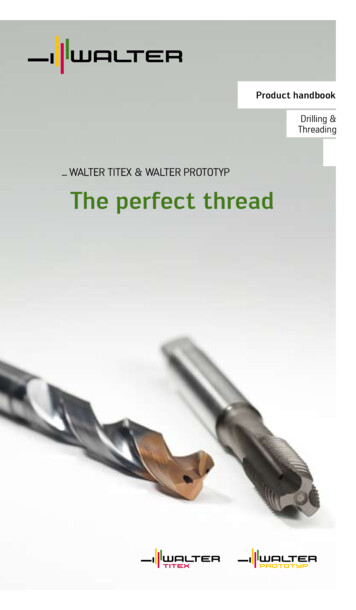
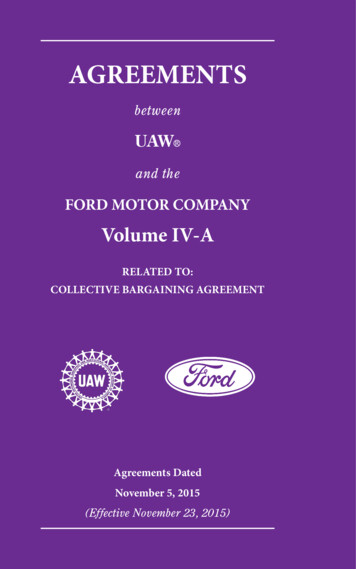
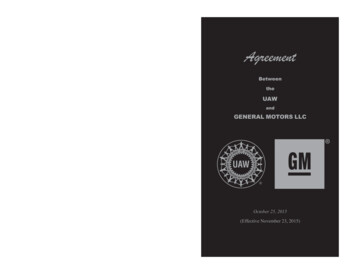
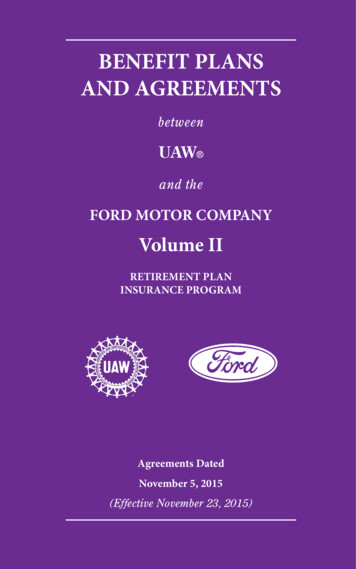
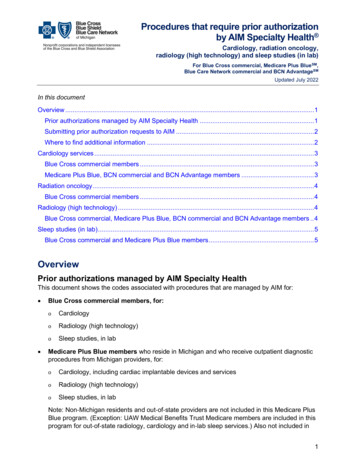
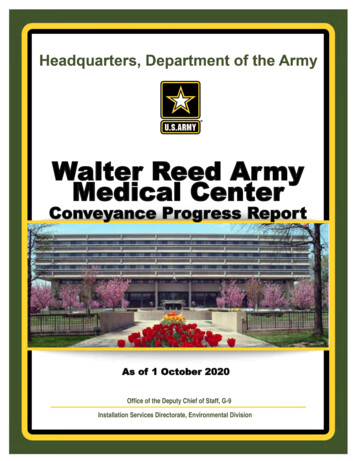
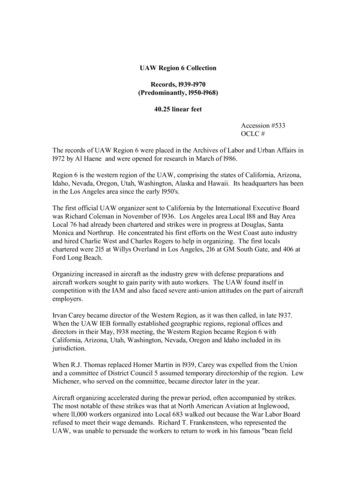
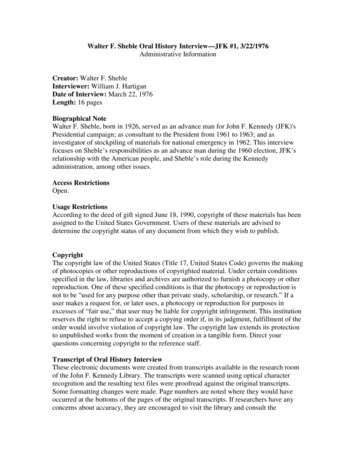
![WELCOME [ montclair.edu]](/img/31/commencement-program-2022.jpg)